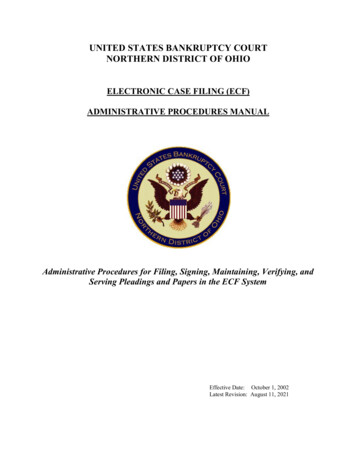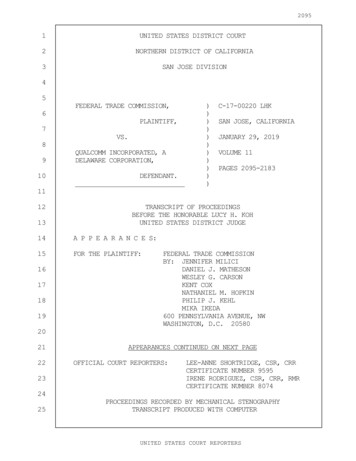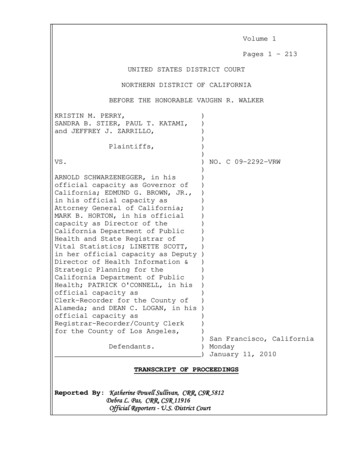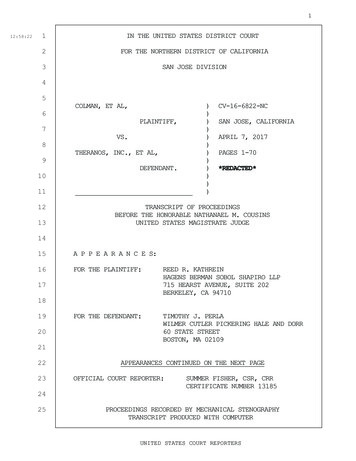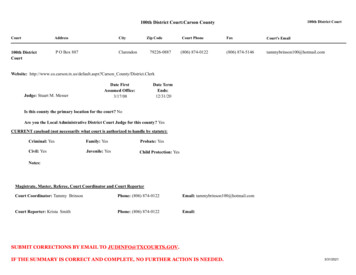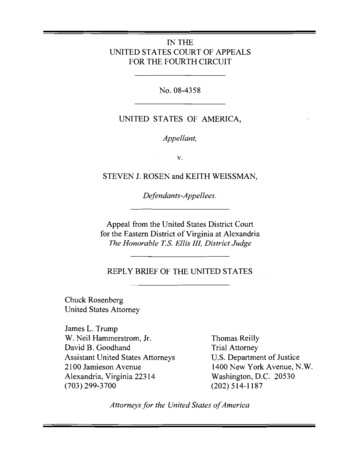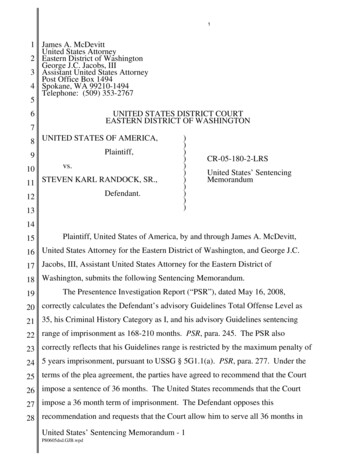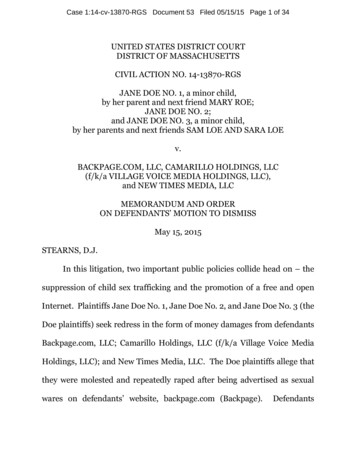
Transcription
Case 1:14-cv-13870-RGS Document 53 Filed 05/15/15 Page 1 of 34UNITED STATES DISTRICT COURTDISTRICT OF MASSACHUSETTSCIVIL ACTION NO. 14-13870-RGSJANE DOE NO. 1, a minor child,by her parent and next friend MARY ROE;JANE DOE NO. 2;and JANE DOE NO. 3, a minor child,by her parents and next friends SAM LOE AND SARA LOEv.BACKPAGE.COM, LLC, CAMARILLO HOLDINGS, LLC(f/k/a VILLAGE VOICE MEDIA HOLDINGS, LLC),and NEW TIMES MEDIA, LLCMEMORANDUM AND ORDERON DEFENDANTS’ MOTION TO DISMISSMay 15, 2015STEARNS, D.J.In this litigation, two important public policies collide head on – thesuppression of child sex trafficking and the promotion of a free and openInternet. Plaintiffs Jane Doe No. 1, Jane Doe No. 2, and Jane Doe No. 3 (theDoe plaintiffs) seek redress in the form of money damages from defendantsBackpage.com, LLC; Camarillo Holdings, LLC (f/k/a Village Voice MediaHoldings, LLC); and New Times Media, LLC. The Doe plaintiffs allege thatthey were molested and repeatedly raped after being advertised as sexualwares on defendants’ website, backpage.com (Backpage).Defendants
Case 1:14-cv-13870-RGS Document 53 Filed 05/15/15 Page 2 of 34contend that most of the Doe plaintiffs’ claims are preempted by theCommunications Decency Act (CDA), 47 U.S.C. § 230, and that theremaining intellectual property claims (unauthorized use of a person’s imageand copyright infringement) fail to state claims upon which relief may begranted.BACKGROUND1Backpage is an online classifieds forum that groups goods and servicesadvertised for sale by geographic location and subject matter. At issue in thiscase is the forum’s adult entertainment section and its subcategory offeringthe services of “escorts.” The Doe plaintiffs allege that in the scungy worldof adult entertainment, this section of Backpage is a notorious haven forpromoters of the illicit sex trade, and even more troubling, the trafficking ofchildren for sex. The Doe plaintiffs contend that Backpage’s business modeldepends in large part on the revenues it earns from its involvement in thetrafficking of children. To this end, Backpage is alleged to have structuredits adult entertainment section to lightly camouflage its illegal content todivert the attention of law enforcement. In support, the Second AmendedComplaint (SAC) marshals the following facts:On a motion to dismiss, the court accepts as true the well-pleadedfacts of a complaint.21
Case 1:14-cv-13870-RGS Document 53 Filed 05/15/15 Page 3 of 34 Backpage charges a fee for posting advertisements in the adultentertainment section (and not in most other licit areas of thewebsite). The fee for the “adult” ads ranges from 12.00 to 17.00per posting. Backpage charges an additional fee for each repostingof an adult ad, and for featuring the ad (with a selection of text andphotos) prominently on the right side of the website. Backpage does not require posters in the adult entertainmentsection to verify their identity. The website also does not requirethat the poster use a registered credit card linked with a name andaddress, and accepts anonymous payments in the form of prepaidcredit cards, or pseudo-currencies, such as Bitcoin. Backpage does not require a poster to verify the age of an “escort”whose services are offered on the website. Although the website willnot accept an ad when the poster enters an age of less than 18, it willpermit the poster to immediately re-enter an assumed age. Backpage does not require any verification of the telephonenumbers posted in its adult entertainment section. It also permitsusers to enter telephone numbers using any combination ofcharacter strokes rather than in the more traceable (by lawenforcement) nominal numbers required in other sections of thewebsite (such as “twoO13fourFive678niNe” rather than “201-3456789”).Backpage does not require posters in the adultentertainment section to use their actual email addresses, butprovides an email forwarding service that protects a poster’sanonymity. Backpage strips out metadata associated with photographs (such asdate, time, geolocation and other identifying information) beforepublishing the photographs on its website. This prevents lawenforcement from effectively searching for repostings of the samephotograph. While Backpage bars the use of certain words and phrases throughits “automatic filtering” system, such as “barely legal,” “highschool,” “innocent,” “sex,” “blow job,” “hand job,” “schoolgirl,”“teen”, and “teenage,” it readily permits the use of suggestive3
Case 1:14-cv-13870-RGS Document 53 Filed 05/15/15 Page 4 of 34circumlocutions like “girl,” “young,” “underage,” and “fresh.” It alsodoes not filter out easily recognizable abbreviations of forbiddenwords, such as “brly legal” or “high schl.”The Doe plaintiffs further allege that defendants have waged a phonywar against sex traffickers to divert attention from their illegal activities.While Backpage claims that its adult entertainment advertisements arescreened by trained moderators, it has refused to install readily availabletechnology that would far more accurately detect the trafficking of children.According to the Second Amended Complaint, Backpage’s highly toutedclaim to make regular referrals to the National Center of Missing & ExploitedChildren has led to few instances of identification or rescue. AlthoughBackpage will on request remove an offending ad in the geographic locationin which it is posted, it does nothing to report or remove the identical adposted in other geographical areas, or other ads involving the same child.The overall effect, the Doe plaintiffs contend, is to create a Potemkin-like“façade of concern” that obscures the shady source of its filthy lucre. SAC ¶34.Jane Doe No. 1, Jane Doe No. 2, and Jane Doe No. 3 aver that they havebeen each personally harmed by defendants’ unsavory business practices.Jane Doe No. 1 was first trafficked by pimps on Backpage after running awayfrom home in February of 2012, when she was 15 years old. She was again4
Case 1:14-cv-13870-RGS Document 53 Filed 05/15/15 Page 5 of 34sold on Backpage in March of 2013, after she ran away a second time.Between June of 2013 and September 10, 2013, her “services” wereadvertised on Backpage each and every day. As a result of the ads, sheengaged in 10 to 12 sex transactions daily with adult men in Massachusettsand Rhode Island. Her pimp moved her from town to town every two daysto avoid detection. Jane Doe No. 1 appeared on some 300 ads on Backpageand was raped over 1,000 times.Backpage listed each ad featuring Jane Doe No. 1 as an offer of “escort”services, a common euphemism for prostitution. The Jane Doe No. 1 adsincluded known signifiers for child prostitution such as “young,” “girl,”“fresh,” “tiny,” “roses,” and “party.” Jane Doe No. 1’s pimp provided aprepaid mobile phone and a prepaid credit card to conceal Jane Doe No. 1’sidentity when Jane Doe No. 1 placed ads on Backpage. When Jane Doe No.1 attempted to enter her true age (which was under 18) during the purchaseof an ad, Backpage would instruct her to enter her age as 18 or older.Photographs of Jane Doe No. 1 (with her facial features obscured, but at leaston one occasion displaying a unique tattoo) accompanied all of her ads.Jane Doe No. 2 was trafficked on Backpage by her pimp during variousperiods between 2010 and 2012 at different locations in Massachusetts. Shefirst appeared on Backpage when she was 15 years old, after she had5
Case 1:14-cv-13870-RGS Document 53 Filed 05/15/15 Page 6 of 34absconded from a residential program. Ads featuring Jane Doe No. 2 wereposted either by her pimp or an older woman who worked with him (his“bottom”). The ads would appear on Backpage on average six times a day.Jane Doe No. 2 was given a prepaid mobile phone to answer calls fromwould-be customers generated by the Backpage ads. As a result of the ads,she was coerced into 5-15 sex transactions every day. Like the ads of JaneDoe No. 1, those of Jane Doe No. 2 featured her photograph. The ads wereplaced using a prepaid credit card. Altogether, Jane Doe No. 2 was rapedover 900 times while in the thrall of her pimp.Jane Doe No. 3 was trafficked on Backpage in December of 2013 by herpimp and one or more of his associates. The Backpage solicitations for theunderage Jane Doe No. 3 described her as “new,” “sweet,” and “playful.” Aswith the other Jane Does, the ads were paid for with a prepaid credit card.Jane Doe No. 3 was also given a mobile phone to take calls and texts fromcustomers. She was taken to a hotel in Foxborough, Massachusetts, whereshe was raped by men who responded to the ads. Photos of Jane Doe No. 3,6
Case 1:14-cv-13870-RGS Document 53 Filed 05/15/15 Page 7 of 34including one that she had taken of herself, appeared with the ads onBackpage.2The Doe plaintiffs brought this lawsuit in October of 2014. In theirSecond Amended Complaint, they allege that defendants’ business practicesviolate the Trafficking Victims Protection Reauthorization Act of 2008(TVPRA), 18 U.S.C. § 1595 (Count I); the Massachusetts Anti-HumanTrafficking and Victim Protection Act of 2010 (MATA), Mass. Gen. Laws ch.265, § 50 (Count II); and constitute unfair and deceptive business practicesunder the Massachusetts Consumer Protection Act, Mass. Gen. Laws ch.93A, § 9 (Count III). The Doe plaintiffs also bring claims for unauthorizeduse of pictures of a person, Mass. Gen. Laws. ch. 214, § 3A and R.I. Gen. Laws§ 9-1-28 (Count IV), and copyright infringement (specific to the photographtaken by Jane Doe No. 3 of herself) (Count V).In January of 2015,defendants moved to dismiss the Second Amended Complaint pursuant toFed. R. Civ. P. 12(b)(6). The parties and several amici curiae3 filed helpfulbriefs. The court heard oral argument on April 15, 2015.At some point, Jane Doe No. 3’s parents became aware of the adsfeaturing their daughter on Backpage and demanded that they be takendown. A week later, the illicit ads still appeared on the website.23 The City and County of San Francisco, the City of Atlanta, the City andCounty of Denver, the City of Houston, the City of Philadelphia, and the Cityof Portland (Oregon) (collectively the local government amici) and the7
Case 1:14-cv-13870-RGS Document 53 Filed 05/15/15 Page 8 of 34DISCUSSIONTo survive a Rule 12(b)(6) motion to dismiss, the factual allegations ofa complaint must “possess enough heft” to set forth “a plausible entitlementto relief.” Bell Atl. Corp. v. Twombly, 550 U.S. 544, 557, 559 (2007); see alsoThomas v. Rhode Island, 542 F.3d 944, 948 (1st Cir. 2008). As the SupremeCourt has emphasized, this standard “demands more than an unadorned,the-defendant-unlawfully-harmed-me accusation. A pleading that offerslabels and conclusions or a formulaic recitation of the elements of a cause ofaction will not do.Nor does a complaint suffice if it tenders nakedassertion[s] devoid of further factual enhancement.” Ashcroft v. Iqbal, 556U.S. 662, 678 (2009) (internal citations and quotation marks omitted).Defendants rely primarily on the immunity provided by Congress inenacting 47 U.S.C. § 230, that “[n]o provider or user of an interactivecomputer service shall be treated as the publisher or speaker of anyinformation provided by another information content provider,” id. §230(c)(1), and the concomitant preemption of “cause[s] of action . . . broughtCommonwealth of Massachusetts submitted two amicus briefs in support ofplaintiffs. The Electronic Frontier Foundation, the Center for Democracy &Technology, and Professor Eric Goldman (of Santa Clara University Schoolof Law) (collectively EFF) submitted an amicus brief in support ofdefendants.8
Case 1:14-cv-13870-RGS Document 53 Filed 05/15/15 Page 9 of 34. . . under any State or local law that is inconsistent with this section.” Id. §230(e)(3).4 There is no dispute that defendants are, as the operators ofBackpage, providers of an interactive computer service. Defendants contendthat because the Doe plaintiffs allege they were harmed by the contents ofpostings that defendants had no part in creating, the claims fall squarelywithin Congress’s exemption of interactive computer service providers fromliability for third-party Internet content.Congress enacted section 230 in 1996, while the Internet was still in itsinfancy.Congress explained the purposes of the law in five pertinentfindings:(1) The rapidly developing array of Internet and other interactivecomputer services available to individual Americans representan extraordinary advance in the availability of educational andinformational resources to our citizens.The Doe plaintiffs argue that the court should first assess theplausibility and sufficiency of the factual allegations relevant to each claimbefore reaching the immunity issue. However, the entitlement to immunityunder section 230 is not only an affirmative defense, but also the right to beimmune from being sued. See, e.g., Carafano v. Metrosplash.com, Inc., 339F.3d 1119, 1125 (9th Cir. 2003); accord Klayman v. Zuckerberg, 753 F.3d1354, 1357 (D.C. Cir. 2014) (Section 230 “can [] support a motion to dismissif the statute’s barrier to suit is evident from the face of the complaint.”);Ricci v. Teamsters Union Local 456, 781 F.3d 25, 28 (2d Cir. 2015) (same).As the Supreme Court counsels, a claim of entitlement to immunity shouldbe “resolv[ed] . . . at the earliest possible stage in litigation.” Hunter v.Bryant, 502 U.S. 224, 227 (1991).49
Case 1:14-cv-13870-RGS Document 53 Filed 05/15/15 Page 10 of 34(2) These services offer users a great degree of control over theinformation that they receive, as well as the potential for evengreater control in the future as technology develops.(3) The Internet and other interactive computer services offer aforum for a true diversity of political discourse, uniqueopportunities for cultural development, and myriad avenues forintellectual activity.(4) The Internet and other interactive computer services haveflourished, to the benefit of all Americans, with a minimum ofgovernment regulation.(5) Increasingly Americans are relying on interactive media for avariety of political, educational, cultural, and entertainmentservices.47 U.S.C. § 230(a). Consistent with these findings, section 230 reflects the“policy of the United States”(1) to promote the continued development of the Internet andother interactive computer services and other interactive media;(2) to preserve the vibrant and competitive free market thatpresently exists for the Internet and other interactive computerservices, unfettered by Federal or State regulation;(3) to encourage the development of technologies whichmaximize user control over what information is received byindividuals, families, and schools who use the Internet and otherinteractive computer services;(4) to remove disincentives for the development and utilizationof blocking and filtering technologies that empower parents torestrict their children’s access to objectionable or inappropriateonline material; and10
Case 1:14-cv-13870-RGS Document 53 Filed 05/15/15 Page 11 of 34(5) to ensure vigorous enforcement of Federal criminal laws todeter and punish trafficking in obscenity, stalking, andharassment by means of computer.Id. § 230(b).The Doe plaintiffs argue that because the Internet has matured sincethe enactment of section 230, the principal policy consideration thatanimated Congress (promoting the growth of the Internet by insulating itfrom regulatory restrictions and lawsuits) no longer has the assuasive forcethat it may once have had. They cite the characterization of section 230’simmunity guarantee as an affirmative defense in cases like Klayman andRicci as evidence that the courts have been whittling back the scope of section230 immunity as the Internet has shed its training wheels. See Klayman,753 F.3d at 1357; Ricci, 781 F.3d at 28. The argument, however, does notbear scrutiny. Both the Klayman and Ricci courts, whatever the label theyused to describe section 230’s effect, found the interactive computer serviceproviders at issue to be immune from any imputation of liability for thirdparty speech. Klayman, 753 F.3d at 1357-1359; Ricci, 781 F.3d at 27-28.Moreover, Congress, far from lowering the immunity bar, ratcheted it up in11
Case 1:14-cv-13870-RGS Document 53 Filed 05/15/15 Page 12 of 342010 by expanding the scope of section 230 immunity to preempt theenforcement of inconsistent foreign judgments. See 28 U.S.C. § 4102(c)(1).5The local government amici attempt to repackage Backpage as an“information content provider,” an entity that section 230 defines as “anyperson or entity that is responsible, in whole or in part, for the creation ordevelopment of information provided through the Internet or any otherinteractive computer service.” 47 U.S.C. § 230(f)(3). Their ultimate point isthat information content providers are excluded from the immunity grantedby section 230. The amici contend that Backpage generates content by: (1)posting illegal materials in sponsored ads; (2) stripping metadata fromposted photos; (3) coaching the crafting of ads by allowing misspellings ofsuggestive terms; and (4) designing the escorts section of the website in sucha way as to signal to readers that sex with children is sold here. The amiciargument relies heavily on Fair Hous. Council of San Fernando Valley v.Roommates.Com, LLC, 521 F.3d 1157 (9th Cir. 2008). In that case, the NinthSection 4102(c)(1) reads as follows: “Notwithstanding any otherprovision of Federal or State law, a domestic court shall not recognize orenforce a foreign judgment for defamation against the provider of aninteractive computer service, as defined in section 230 of theCommunications Act of 1934 (47 U.S.C. 230) unless the domestic courtdetermines that the judgment would be consistent with section 230 if theinformation that is the subject of such judgment had been provided in theUnited States.”512
Case 1:14-cv-13870-RGS Document 53 Filed 05/15/15 Page 13 of 34Circuit determined Roommates.com, a roommate matching service, to be an“information content provider” shorn of section 230 immunity because itelicited information about personal characteristics of users that is forbiddenby the Fair Housing Act. Id. at 1169-1170. The Court reasoned thatRoommate’s connection to the discriminatory filtering process isdirect and palpable: Roommate designed its search and emailsystems to limit the listings available to subscribers based on sex,sexual orientation and presence of children. Roommate selectedthe criteria used to hide listings, and Councils allege that the actof hiding certain listings is itself unlawful under the Fair HousingAct, which prohibits brokers from steering clients in accordancewith discriminatory preferences.Id.To get to its result, the Court in Roommates attempted to draw a linebetween active control of the content of a web posting and the provision of aneutral interactive service that simply replicates offending third-partymatter.6If an individual uses an ordinary search engine to query for a“white roommate,” the search engine has not contributed to anyalleged unlawfulness in the individual’s conduct; providingneutral tools to carry out what may be unlawful or illicit searchesdoes not amount to “development” for purposes of the immunityexception. . . . Similarly, a housing website that allows users tospecify whether they will or will not receive emails by means ofuser-defined criteria might help some users exclude email fromRoommates is one of the few sentinels denying section 230 immunityleft standing among some 300 cases (as of 2012) that have decided the issue.See Hill v. StubHub, Inc., 219 N.C. App. 227, 239 (2012).136
Case 1:14-cv-13870-RGS Document 53 Filed 05/15/15 Page 14 of 34other users of a particular race or sex. However, that websitewould be immune, so long as it does not require the use ofdiscriminatory criteria. A website operator who edits usercreated content – such as by correcting spelling, removingobscenity or trimming for length – retains his immunity for anyillegality in the user-created content, provided that the edits areunrelated to the illegality.Id. at 1169 (bold emphasis added). This latter passage lays out the distinctionthat afforded immunity to craigslist.com, an online classifieds forum thatalso published discriminatory housing ads. “Nothing in the service craigslistoffers induces anyone to post any particular listing or express a preferencefor discrimination; for example, craigslist does not offer a lower price topeople who include discriminatory statements in their postings.” ChicagoLawyers’ Comm. for Civil Rights Under Law, Inc. v. Craigslist, Inc., 519F.3d 666, 671-672 (7th Cir. 2008).Singly or in the aggregate, the allegedly sordid practices of Backpageidentified by amici amount to neither affirmative participation in an illegalventure nor active web content creation. Nothing in the escorts section ofBackpage requires users to offer or search for commercial sex with children.The existence of an escorts section in a classified ad service, whatever itssocial merits, is not illegal. The creation of sponsored ads with excerptstaken from the original posts reflects the illegality (or legality) of the originalposts and nothing more. Similarly, the automatic generation of navigational14
Case 1:14-cv-13870-RGS Document 53 Filed 05/15/15 Page 15 of 34path names that identify the ads as falling within the “escorts” category is notcontent creation. See Seldon v. Magedson, 2014 WL 1456316, at *5-6 (D.Ariz. April 15, 2014). The stripping of metadata from photographs is astandard practice among Internet service providers. Hosting anonymoususers and accepting payments from anonymous sources in Bitcoins,peppercorns, or whatever, might have been made illegal by Congress, but itwas not.Backpage’s passivity and imperfect filtering system may beappropriate targets for criticism, but they do not transform Backpage into aninformation content provider.Although the Doe plaintiffs recognize that defendants did not authorthe content of the offending ads, see Opp’n at 16 (“Plaintiffs’ traffickingclaims do not seek to ‘impute’ to [d]efendants any advertisements created byothers”), they challenge the breadth of the immunity sought by defendants.Count I alleges a violation of a section of the TVPRA, a federal statute thatcriminalizes sex trafficking. As the Doe plaintiffs note, section 230 expresslystates that “[n]othing in this section shall be construed to impair theenforcement of section 223 or 231 of this title, chapter 71 (relating toobscenity) or 110 (relating to sexual exploitation of children) of Title 18, orany other Federal criminal statute.”47 U.S.C. § 230(e)(1) (emphasisadded). Plaintiffs contend that defendants’ business practices, “even if the15
Case 1:14-cv-13870-RGS Document 53 Filed 05/15/15 Page 16 of 34advertisements had never been posted,” Opp’n at 16, are sufficient to makeout a violation of the TVPRA. Furthermore, according to the Doe plaintiffs,section 230 only immunizes “action voluntarily taken in good faith to restrictaccess to or availability of material that the provider or user considers to beobscene, lewd, lascivious, filthy, excessively violent, harassing, or otherwiseobjectionable, whether or not such material is constitutionally protected.” 47U.S.C. § 230(c)(2)(A) (emphasis added). The Doe plaintiffs argue that theirclaims are of a different sort – they allege that defendants have intentionallyand in bad faith hidden behind ineffectual counter-trafficking measures todeflect the scrutiny of law enforcement and social services agencies. CountII alleges a violation of the MATA, the Massachusetts analog to the TVPRA.The Doe plaintiffs argue that, because claims under the TVPRA are exemptfrom the scope of section 230’s immunity, the claim under MATA does notdepend on “inconsistent state law” preempted by section 230. Count III,which presses a claim of unfair and deceptive businesses practices underMassachusetts law, is alleged to arise not from the posted ads and theircontents, but from the architecture of Backpage itself, which the Doeplaintiffs contend is constructed to conceal illegal activity from lawenforcement. Finally, the Doe plaintiffs rely on Congress’s stricture thatsection 230 “shall not be construed to limit or expand any law pertaining to16
Case 1:14-cv-13870-RGS Document 53 Filed 05/15/15 Page 17 of 34intellectual property,” id. § 230(e)(2), as preserving the intellectual propertyclaims (unauthorized publicity and copyright infringement).7 I will examinethe viability of each count in turn.Civil Remedy under the TVPRA18 U.S.C. § 1595 provides victims of trafficking the right to bring aprivate civil action for restitution against “whoever knowingly benefits,financially or by receiving anything of value from participation in a venturewhich that person knew or should have known has engaged in an act inviolation of this chapter.”The parties dispute whether a civil actionauthorized by a criminal statute can be construed as “enforcement of . . . aFederal criminal statute” exempt from the immunity provided by section230(e)(1).8Defendants do not rely on section 230 immunity with respect to thecopyright infringement claim, but contend, to be discussed infra, that itshould be dismissed on other grounds.7The Doe plaintiffs, citing Barnes v. Yahoo!, 570 F.3d 1096 (9th Cir.2009), also contend that their TVPRA claim falls outside of the protectionsof section 230 immunity because section 1595 imposes a duty of care ondefendants wholly independent of their role as publishers of speech. InBarnes, the Ninth Circuit barred a negligent undertaking claim underOregon law that sought to hold Yahoo liable for an alleged failure to removeindecent profiles of a plaintiff that had been posted by her ex-boyfriendbecause the claim attempted to impose publisher liability on Yahoo forcontent created by a third party. Id. at 1102-1105 (“The word ‘undertaking,’after all, is meaningless without the following verb. That is, one does not178
Case 1:14-cv-13870-RGS Document 53 Filed 05/15/15 Page 18 of ,“enforce[ing] . . . a Federal criminal statute,” implies more than adependence on criminal prosecution alone. See Black’s Law Dictionary (10thed. 2014) (to “enforce” is “[t]o give force or effect to” or “[l]oosely, to compela person to pay damages for not complying with . . . .”). Further, plaintiffscontend that civil actions are frequently authorized as part and parcel of theenforcement regime behind criminal statutes. See Luka v. Procter & GambleCo., 785 F. Supp. 2d 712, 719 (N.D. Ill. 2011) (“[C]ivil enforcementmechanisms [] permit private parties to sue to enforce statutorymerely undertake; one undertakes to do something. And what is theundertaking that Barnes alleges Yahoo failed to perform with due care? Theremoval of the indecent profiles that her former boyfriend posted on Yahoo’swebsite. But removing content is something publishers do, and to imposeliability on the basis of such conduct necessarily involves treating the liableparty as a publisher of the content it failed to remove.”).The Court did, however, allow a claim of promissory estoppel to standon the allegation that a Director of Communications at Yahoo had contactedplaintiff and promised to remove the offending ads, but failed to do so in atimely manner. Id. at 1107-1109. “Contract liability here would come notfrom Yahoo’s publishing conduct, but from Yahoo’s manifest intention to belegally obligated to do something, which happens to be removal of materialfrom publication.” Id. at 1107. There is no claim by the Doe plaintiffs thatany such assurance was given to them by Backpage. As Barnes illustrates,the existence of a statutory remedy without more does not give rise mirabiledictu to a tort duty. If it did, there would no need to create such a remedy inthe first place.18
Case 1:14-cv-13870-RGS Document 53 Filed 05/15/15 Page 19 of 34prohibitions.” (emphasis added)). Plaintiffs also rely on dicta in Nieman v.Versuslaw, Inc., 2012 WL 3201931, at *9 (C.D. Ill. Aug. 3, 2012), surmisingthat section 230 “arguably . . . may not be used to bar a civil RICO claimbecause that would impair the enforcement of a Federal criminal statute.”Defendants, for their part, point out that courts have consistentlyrejected this argument in a section 230 immunity context. In Doe v. Bates,2006 WL 3813758 (E.D. Tex. Dec. 27, 2006), the court held that Yahoo couldnot be held civilly liable for allegedly knowingly hosting child pornographyon a user site styled as the Candyman e-group. The Magistrate Judgeexamined “th[is] issue of first impression” in scholarly detail that is worthquoting at length. Id., at *3.The plain text of the statute establishes that the 230(e)(1)exception does not encompass private civil claims. As argued byDefendant, the common definition of the term “criminal,” as wellas its use in the context of Section 230(e)(1), specifically excludesand is distinguished from civil claims. The term “criminal” isdefined as “[c]onnected with the administration of penal justice.”Black’s Law Dictionary 302; see also American HeritageDictionary of the English Language 430 (4th ed. 2000) (defining“criminal” as “[r]elating to the administration of penal law”).The term “civil” is defined as follows: “[o]f or relating to privaterights and remedies that are sought by action or suit, as distinctfrom criminal proceedings.” Black’s Law Dictionary 262(emphasis added). In addition, Congress’ use of the word“enforcement” in Section 230(e)(1) again confirms that theexception refers to governmental action, not civil actions by aprivate litigant.19
Case 1:14-cv-13870-RGS Document 53 Filed 05/15/15 Page 20 of 34Congress did not bifurcate any statutes as asserted by Plaintiffs.Rather, as noted by Defendant, it preserved the ability of lawenforcement officials to enforce the federal criminal laws to theirfullest extent while
Jane Doe No. 2 was given a prepaid mobile phone to answer calls from would-be customers generated by the Backpage ads. As a result of the ads, she was coerced into 5-15 sex transactions every day. Like the ads of Jane Doe No. 1, those of Jane Doe No. 2 featured her photograph. The ads were placed using a prepaid credit card.

